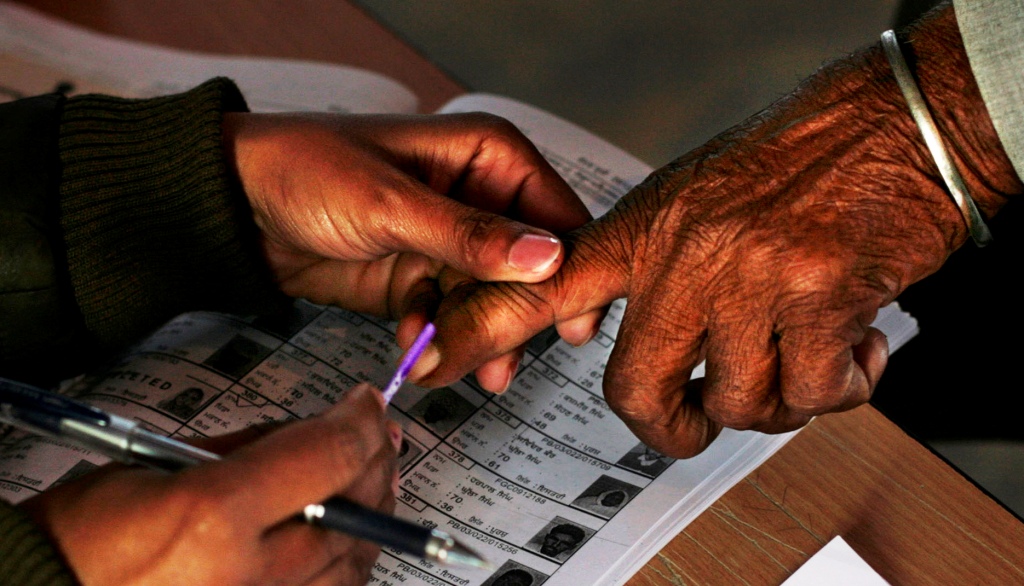BeyondHeadlines News Desk
Ahead of the 2014 Haryana assembly elections, Association for Democratic Reforms (ADR) and National Election Watch (NEW) organized a Media Dialogue at the Press Club of India, Delhi, to brainstorm on mounting pressure on Political Parties to restrain them from fielding candidates facing criminal charges and misusing influence of money power in the coming polls and other related issues.
The State of Governance and Functioning of Government Institutions in Haryana was discussed by speakers including Prof. Jagdeep Chhokar, Founder Member, ADR and NEW, Former Director In-Charge, IIM-Ahmedabad, Sharad Gupta (Dainik Bhaskar), Satya Prakash (Hindustan Times), Archana Kapoor (Radio Mewat), Tridib Raman (NTI Media Ltd–ETV)
They discussed the existing state of governance in Haryana and the implications of weakening government bodies on the upcoming elections. Satya Prakash said, “Caste and community has always played a vital role in Haryana elections and the representation of women is also very low in the state. Attention has to be paid to thwart the attempts of political parties to appoint corrupt and politically loyal bureaucrats at key positions.” He added that Civil Society Organisations and the media should put pressure to appoint only fair, independent and honest officers at key positions. It is very important to improve the condition of democratic institutions in the state by putting checks and balances against each other.
Tridib Raman pointed that earlier, violence was quite prevalent during elections in Haryana but now the condition has significantly improved. He also mentioned that in the 90s, shooting incidents and booth capturing were quite common and voters could not even get out of their houses to vote due to fear.
Archana Kapoor , while narrating incidents and issues faced in Mewat district, said that the biggest issue in elections is caste based politics. If a candidate is fighting elections, despite being corrupt, he will be voted to power. She said that there was hardly any support from the Police during elections. She further informed that women and young voters were still not allowed to vote. Despite being only 70kms away from the capital region, there is hardly any development in the district. However, she was hopeful that the nexus between crime and politics, which prevents the common man from exercising his right will soon be broken.
Sharad Gupta said, institutions are dysfunctional in Haryana. They are almost non-existent. Every government which comes to Haryana is involved in many scams in the state. He said that the major industry in Haryana was that of ‘Change of Land Use.’
The Issue of Paid News and Media’s Responsibilities during Elections was also discussed by speakers including Vipul Mudgal, Visiting Senior Fellow, CSDS, Sanjay Kapoor (Hardnews), Alka Saxena, Journalist. They talked about the increasing influence of Paid News and how it plays a major role in opinion building process, especially in relation to the elections and suggest ways to deal with this menace.
Vipul Mudgal said that paid news is quite evident. All the laws in Haryana in the last 10 years have been passed without any discussion in the Assembly. Vested interests may have been writing the entire policy because of lack of intervention. He said intervention succeeds eventually. Therefore, right interventions in the right places is needed.
Alka Saxena pointed, “The journalists and media houses involved in paid news should be heavily penalised. The term ‘paid news’ was coined around the 2004 elections, and became fully established industry by 2009. Both politicians and journalists or media houses approach each other for mutual monetary or other benefits like allotment of land, licenses for other businesses etc.”
While discussing the curbing of the influence of money in elections, speakers discussed that how without money a multi-party democracy cannot function. At the same time the excessive use of money by any of the stakeholders is worrisome. One of the major concerns during elections is vote buying. The ECI seized Rs. 315 crores of cash in duration of 20 days. Similarly, ECI has also seized huge amounts of illegal liquor and drugs.
There is no law which bans carrying of cash and so the ECI started with flying squads, and static teams in places where such incidents are likely to happen. Money is being carried in surreptitious ways, in the bonnet of the car, in helicopters, ambulances etc. Such incidents have been noted in the Lok Sabha elections.
Shahid Parvez said that most of the money swirling through our political system is black money. We must make our system open, transparent and clean. ECI has directed all political parties to record the details of every donor, even below Rs. 20,000. This will be a revolutionary move and will help improve transparency and accountability in our political system.
Guidelines which does not have statutory backing can be amended to provide more powers to the ECI. Maintaining meticulous records for every donor will be a positive step towards making the political parties transparent and abolishing black money from elections.
The media persons recommended that the appointment of MCMC committees should be unbiased. Capacity building of members is also necessary. ADR and other civil society should frame a policy to build transparency and accountability.
There are very few CSOs in Haryana. We can focus on civil society activism. Media can assist in encouraging civil society to acquire momentum, coherence and visibility.






















